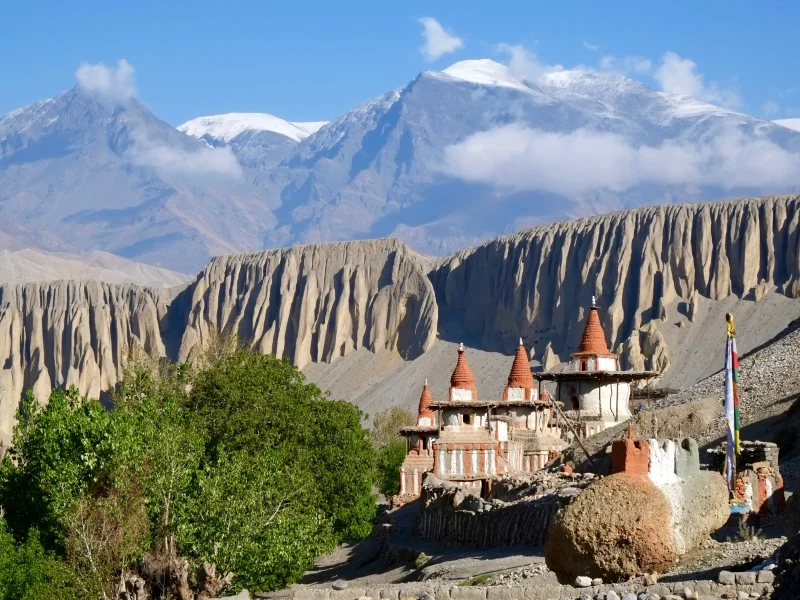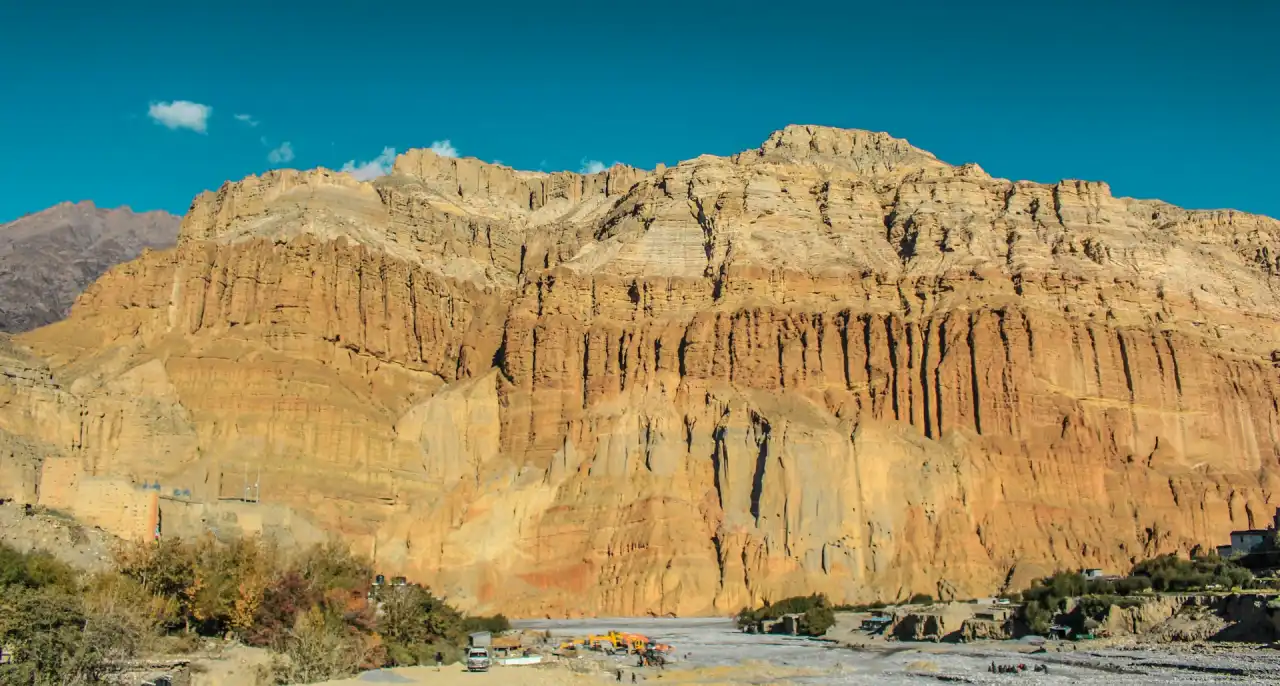Upper Mustang, located in the northwestern part of Nepal, is a hidden gem known for its rugged terrain, ancient monasteries, and unique cultural heritage. The region, carved by the Kali Gandaki River over millions of years, offers breathtaking views and is home to the Tibetan Buddhist royal past. Upper Mustang Altitude and temperature play great challenges for trekkers.
Trek Me Nepal offers authentic cultural exchanges with local communities, such as the Thakali people, who welcome travelers with open arms. This enchanting destination is a once-in-a-lifetime experience that leaves a lasting impression on the soul.
Despite challenges like high altitude and unpredictable weather, the rewards of trekking in Upper Mustang are worth it, offering new perspectives on the region, ancient trade routes, nomadic herders, and wildlife.
When Is the Best Time To Visit The Upper Mustang?
The best time to visit Upper Mustang is during the spring and autumn months, which span from March to May and September to November, respectively. These seasons offer the most favorable weather conditions for trekking and exploring the region’s cultural treasures.
During spring (March to May), Upper Mustang experiences mild temperatures. The landscape bursts into bloom with vibrant colors as flowers adorn the valleys and hillsides. The air is refreshing, making it an ideal time for trekking amidst the breathtaking scenery of Upper Mustang Altitude.
Additionally, the weather is generally stable during spring, with minimal rainfall and clear skies, providing optimal conditions for outdoor activities and sightseeing. In autumn (September to November), Upper Mustang welcomes travelers with pleasant temperatures.
The skies are clear, offering stunning views of the surrounding Himalayan peaks, including the iconic Annapurna and Dhaulagiri ranges. Autumn is considered the best time to visit Upper Mustang Altitude for trekking and exploring the region’s cultural heritage, as the weather is ideal and the trails are not yet affected by winter snowfall.
Both spring and autumn offer unique opportunities to experience the beauty and tranquility of Upper Mustang.
Whether you’re trekking along ancient trade routes, visiting centuries-old monasteries, or immersing yourself in the vibrant culture of the indigenous Thakali people, the best time to visit Upper Mustang is during these seasons when the weather is most favorable and the landscape is at its most enchanting.
 Exploring the Upper Mustang Altitude of The Forbidden Kingdom
Exploring the Upper Mustang Altitude of The Forbidden Kingdom
Ascending into the heart of Upper Mustang, trekkers find themselves navigating terrain that ranges from 2,800 meters (9,200 feet) to over 4,000 meters (13,100 feet) above sea level. The journey unfolds amidst towering cliffs, deep valleys, and rugged hillsides, each step leading to new heights and breathtaking panoramas.
At such elevations, the air grows thin, and the effects of altitude become palpable. Shangrila Adventure ensures travelers are equipped to handle the challenges of high altitude trekking, providing expert guidance on acclimatization and safety measures.
Taking gradual steps upward allows the body to adjust to the decreased oxygen levels, reducing the risk of altitude-related illnesses such as acute mountain sickness (AMS). Despite the thin air, Upper Mustang altitude rewards adventurers with unparalleled views of the surrounding Himalayan peaks, including the towering Annapurna and Dhaulagiri ranges.
Shangrila Adventure leads trekkers on a journey to ancient monasteries, perched on rocky cliff sides, offering glimpses into the region’s rich cultural heritage and spiritual significance.
Encountering the Indigenous Communities: Tradition in the Heights
As trekkers ascend further into the heights of Upper Mustang, they encounter the resilient communities of the indigenous Thakali people, whose ancestors have called these lofty landscapes home for centuries.
Through Shangrila Adventure’s immersive cultural experiences, travelers gain insight into the daily lives and traditions of these mountain-dwelling communities, forging connections that transcend language and altitude.
The Upper Mustang altitude presents challenges, but it also offers rewards beyond measure. With Shangrila Adventure as their guide, travelers embark on a transformative journey through this remote Himalayan kingdom, where every step leads to new heights of discovery and wonder.
 Experiencing the Seasons: Temperature Variations in Upper Mustang
Experiencing the Seasons: Temperature Variations in Upper Mustang
In Upper Mustang, the temperature fluctuates significantly, reflecting the region’s diverse climate and varied terrain. Throughout the year, trekkers experience a range of temperatures, from mild to extreme, depending on the season and altitude.
Spring Splendor: Mild Weather and Blooming Landscapes
During the spring months of March to May, Upper Mustang experiences relatively mild temperatures, with daytime highs averaging between 15°C to 25°C (59°F to 77°F). The landscape comes alive with vibrant colors as flowers bloom, and the air is crisp and refreshing. This season is ideal for trekking, as the weather is generally stable, and the trails are not yet affected by monsoon rains.
Summer Heat: Warm Days and Occasional Showers
As spring transitions into summer, temperatures in Upper Mustang begin to rise, with daytime highs reaching up to 30°C (86°F) or higher in some areas. Summer, from June to August, brings warmer weather and occasional monsoon rains, particularly in the lower valleys. While the days can be hot and humid, evenings are cooler, providing relief from the daytime heat.
Fall Foliage: Pleasant Weather and Clear Skies
Fall, from September to November, is considered the best time to visit Upper Mustang, as temperatures are pleasant, ranging from 15°C to 25°C (59°F to 77°F) during the day. The skies are clear, offering stunning views of the surrounding Himalayan peaks, and the weather is ideal for trekking and exploring the region’s cultural treasures.
Winter Wonderland: Cold Temperatures and Snowfall
Winter in Upper Mustang, from December to February, brings cold temperatures and occasional snowfall, especially at higher elevations. Daytime highs hover around 10°C (50°F), while nighttime temperatures can drop well below freezing, reaching as low as -10°C (14°F) or lower. Despite the cold, winter offers a unique opportunity to experience the region’s tranquility and beauty, with fewer tourists and pristine landscapes blanketed in snow.
Shangrila Adventure advises travelers to pack appropriate clothing for Upper Mustang’s fluctuating temperatures, including warm jackets, insulated gloves, thermal underwear, and waterproof outerwear, and stay hydrated. Upper Mustang’s diverse climate and natural beauty make it an ideal destination for travelers seeking a diverse experience in the Himalayan region.
Conclusion
In conclusion, Shangrila Adventure guides travelers through the challenging altitude and temperature of Upper Mustang, a remote Himalayan region. The region offers stunning landscapes, but requires careful acclimatization and proper gear. Regardless of the season, Upper Mustang offers unique charm. With Shangrila Adventure, travelers embark on a transformative journey, embracing the challenges of altitude and temperature for an unforgettable experience.
FAQs
What is the altitude range of the Upper Mustang?
Upper Mustang ranges in altitude from approximately 2,800 meters (9,200 feet) to over 4,000 meters (13,100 feet) above sea level.
What is the best time to visit Upper Mustang in terms of temperature?
The best time to visit Upper Mustang in terms of temperature is during the spring and autumn months, from March to May and September to November, when temperatures are relatively mild and comfortable during the day.
What temperature range can I expect during my trek to Upper Mustang?
Temperatures in Upper Mustang vary depending on the season. During the spring and autumn months, daytime temperatures typically range from 15°C to 25°C (59°F to 77°F). In winter, daytime highs can hover around 10°C (50°F), while nighttime temperatures can drop well below freezing, reaching as low as -10°C (14°F) or lower.
How does Shangrila Adventure help travelers prepare for the altitude and temperature challenges of Upper Mustang?
Shangrila Adventure provides expert guidance on acclimatization and safety measures to help travelers handle the challenges of high altitude trekking. They also offer recommendations on proper gear, such as warm jackets, insulated gloves, and waterproof outerwear, to ensure travelers are prepared for the fluctuating temperatures of Upper Mustang.
What are the risks associated with high altitude trekking in Upper Mustang?
The main risk associated with high altitude trekking in Upper Mustang is acute mountain sickness (AMS), which can occur when ascending too quickly to high elevations. Symptoms of AMS include headaches, fatigue, and nausea. Shangrila Adventure advises travelers to acclimatize gradually and stay hydrated to reduce the risk of AMS.


Comment (0)